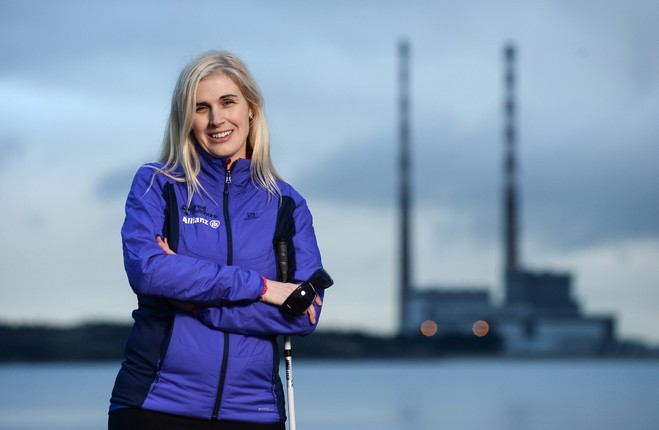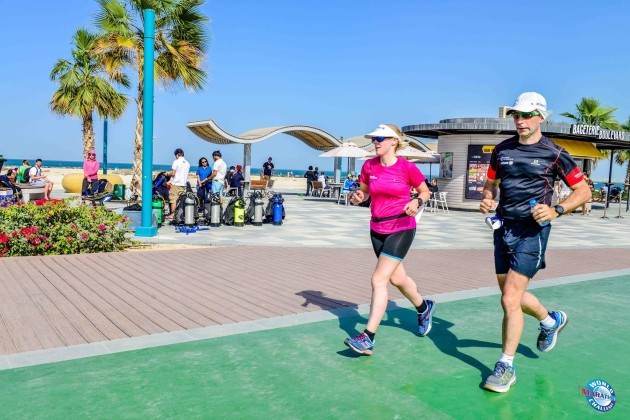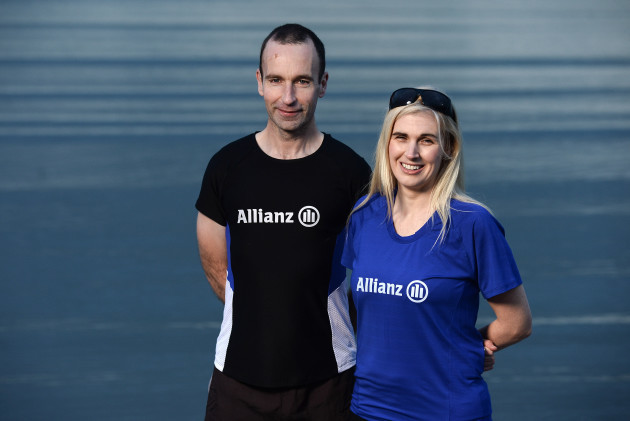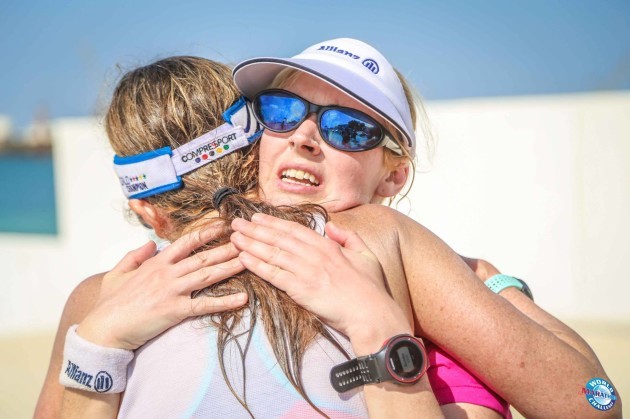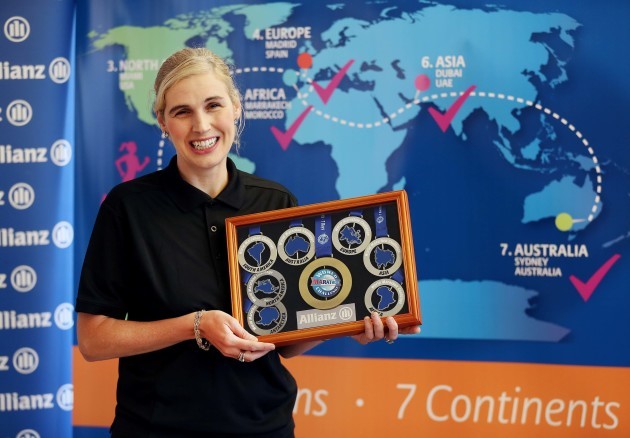A TRULY UPLIFTING, and inspirational, story. One of defiance, courage and pure, undiluted, determination. The type born out of a single-mindedness to defy the odds and beat them.
Sinéad Kane has been doing that all her life; it’s part of her DNA. The more hurdles put in her way, the more she longs to get over them.
Last Sunday, the Cork woman made history as she became the first visually impaired athlete to complete the World Marathon Challenge. A year of hard work and sacrifice culminated in thrilling achievement in Sydney.
Alongside her guide runner John O’Regan, Kane completed seven marathons on seven continents on seven consecutive days. Antarctica, Chile, Miami, Madrid, Marrakech, Dubai and Sydney. 184 miles.
Just let the magnitude of that achievement sink in. Defying the odds, pushing boundaries we never knew existed and proving those that told her it wasn’t possible wrong.
“I’ve been preparing for this challenge for such a long time. It took a full year and then it just all happened in the space of a week and it all seems to have happened so quickly,” Kane says.
“This time last week I was running a marathon in Marrakech and the week before I was running a marathon in Antarctica and today I’m in Dublin so it just seems like I’ve been on a whirlwind journey. It hasn’t fully sunk in yet but I’m proud of myself.”
As clichéd as it sounds, it has been an incredibly long, and arduous, journey to this point for Kane. There have been countless setbacks, and moments in time when the flame began to flicker. Discrimination, bullying and rejection. All of it led Kane to question whether she was meant to run, whether her disability meant it just wasn’t meant to be.
Since returning to Dublin during the week, Kane has been overwhelmed by the messages of support — but it hasn’t always been this way.
“When I was in primary school I was very badly bullied,” Kane explains. “There was a lot of physical bullying.
“Students would hide on me and because I can only see three feet in front of me, they would put my schoolbag five feet in front of me and they’d say that they had hidden it. They would hide books on me. I would end up with bruises and people would think that I had accidentally fallen, but it was because other children had hit me. In secondary school, it was isolation. People saw me as an awkward difficult student.”
As difficult as it was, those experiences have ultimately shaped Kane’s outlook. There is a steely determination and an added motivation to challenge convention and show the world, and those that ridiculed her because of her disability, that the human body knows no limits.
“Anyone can say they want to inspire people, but it’s actually about getting out there and doing the task,” she continues.
“I hope that I don’t have to tell people that I want to inspire them. I hope they can look at the challenge that I’ve done and feel inspired. Whether you have a disability or not.
“They don’t have to do seven continents, seven marathons in seven days to be successful. You only have to set your own personal goals. I think what differentiates me from other people is the fact that I’m willing to make sacrifices.
“The road to greatness is lonely and the road in 2016 has been very lonely. I’ve made a lot of sacrifices to achieve this goal and encountered a lot of rejection. Even though there’s all this overwhelming support now, there were some people who weren’t there on the rainy and cold days.
“They didn’t feel the loneliness I felt on those days. They didn’t feel the rejection that I felt when another sponsor said they would but then let me down. I’m thankful for all the support I have now. But to get to this point, it hasn’t happened overnight. It’s been a lot of hard work.”
This has been a lifetime in the making. Kane may trace preparations back to this time last year but it has taken far longer to break down those boundaries. To prove that she deserves to be treated like any other athlete. To prove that, able-bodied or not, visually impaired or not, there should be no discrimination.
Last night she was on the Late Late Show to talk about her achievements but the last time a member of her family appeared on the show, it was in entirely different circumstances.
Kane’s mother, Marian, who is completely blind, was an ardent campaigner for the rights of guide dog owners and took to national television to bring the issue to prominence when Kane was just eight.
Nearly three decades on, Kane is leading the campaign and looking to inspire others in a similar position. The setbacks have emboldened her and provided the impetus to go on and achieve what she has.
But she hasn’t done so alone. As the 34-year-old sits at the top of the room, John O’Regan stays out of the limelight but the role he has played cannot be emphasised enough.
When Kane started running five years ago, she needed a guide and O’Regan has been by her side ever since.
“It’s been very important for me to have my guide runner in my life over the last year,” she says. “It’s so that I’m not just dealing with things by myself. He believes in my ability to achieve the goal. When I did get the rejection, I was able to talk it out with him.
“You have to get through the feeling of hopelessness and the following days starting again. To do that you need the skill to be able to bounce back and know the reason why you’re doing it.
“If you don’t know the reason why when you’re positive, you definitely won’t when you’re feeling negative. There are energy vampires out there who will try to suck your energy. There are people out there who want me to fail. There are a lot of people supporting me, but some people who want to be able to say ‘oh, I knew she wouldn’t do it’. It’s easier to criticise and judge.
“Knowing that there are people out there who want to try and make you fail, that almost drives you more.”
Kane has no shortage of motivation, but it could have been a lot different. On more than one occasion during her seven marathon feat, Kane — who in 2009 also became Ireland’s first legally blind solicitor — wanted to throw in the towel and accept that she wasn’t meant to complete an event like this.
“It was harder than I thought,” she admits. “For example, in my first race in Antarctica I wore wool socks and trail running shoes and normally I wouldn’t wear them but I got blisters on my feet on the first six miles.
“I didn’t want to stop but I knew I had another six marathons after this one and if you injure your feet badly today you might not get to race number two tomorrow. To be in there and waiting for the doctor. It just felt so long waiting for him to bandage it up. I was like ‘come on, come on, you’re wasting time and I’m losing position out there.’
“That was difficult, I wasn’t expecting that. I wasn’t expecting my feet to swell upon the plane also. I had imagined this lovely chartered flight where it was business class with reclining seats and I would just fall off to sleep. I don’t think I got three or four hours sleep combined throughout the whole thing because I thought I would get asleep on these reclining seats but I didn’t.
“I didn’t expect I’d literally have to squash my feet into the runners. There were days there before the marathon where I said to John my feet wouldn’t actually fit into my runners so I wore sandals until the last-minute and then on the start line we just had to squash my feet into the runners.”
Kane was able to overcome all of those physical obstacles, but psychologically she found herself in a bad place in Marrakech. Everything had taken its toll.
“The course didn’t suit me,” she explains. “There was an 800 metre stretch with a lot of trees in the middle and on the path. There was also a drop down and it just made it too difficult to run side by side so we had to walk single file.
“It wasn’t working out for us and it was 13 laps so when I was going around that lap each time I had to walk it. I was losing time and race position and it was very difficult mentally for me. I wanted to run but couldn’t run. Other runners were passing me because they were fully sighted and could run in a straight line, single file.
“I found that very difficult and we tried to go out onto the road but that proved too dangerous so we had to go back on the route. We were walking along and then a bit further along, John just turned away for a split second and I banged my foot off something. I was in extreme pain starting off anyway with the blisters and then I banged my foot and I was in absolute agony.
“I was very annoyed with John. I said ‘why weren’t you looking, you’re meant to be guiding me’ and all of this. I took out a lot of anger and frustration. He very politely said ‘in fairness Sinead we’re on day five and this is the first time you’ve hit against something.’
“In the moment I was so frustrated because I felt my disability was holding me back. I just let out a lot of anger. I took off my race number and belt and said that was it, I’m not finishing this marathon, I’m not doing the sixth or seventh marathon and I’m not doing any running when I go back to Ireland because it’s clear I’m not meant to be a runner. It’s clear that my disability is holding me back and I was just in a very negative state of my mind.
“John wanted to guide me to the aid station but I said ‘don’t touch me, I don’t want anyone to touch me or to talk to me.’ I was being quite unreasonable but John got me to the aid station and the doctor gave me tablets for the pain.
“And then a coach started to chat to me and tried to coax me back into it and I didn’t know but John was behind us with the race numbers and ready to start the race again. I had decided at that point I wasn’t going to do the run. This guy anyway just kept asking me about why was I doing this, why had I come on this journey. Was I not concerned about my sponsor or not concerned about making John proud or making people back home in Ireland proud but when you’re in that moment of just complete frustration you can’t even think about anyone else. He talked me around and I was able to start back again.
“John suddenly appeared, even though I didn’t know he had been behind all along. That had been a set-up between him and Paul [coach]. I started running again and that was it.”
The Youghal native would go on to cross the line in Sydney and etch her name into the history books. Mission accomplished. Defying the odds.
The only question that remains is what’s next?
“At the moment I’m just concentrating on this goal and living in the moment,” Kane adds. “There is a sense of loss because this goal has been so big, I can’t really think of another goal to do now to top it.
“I have to go back to the drawing board. I have to make some big decisions. Different people are coming to me. But for me, it has to top what I’ve just done.”
You get the feeling that that’s another challenged accepted.
The42 is on Instagram! Tap the button below on your phone to follow us!
